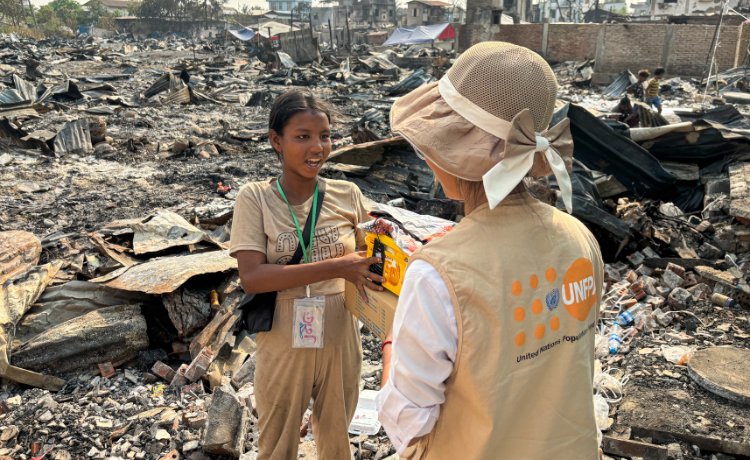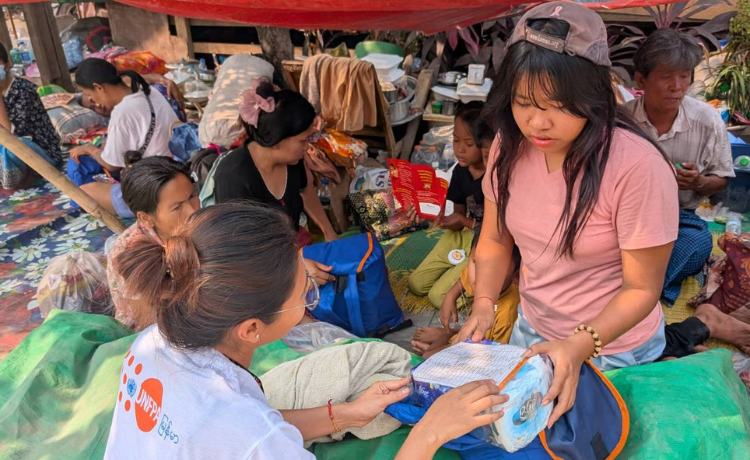News
“Everything fell apart in seconds”: Women and girls need urgent support after disastrous earthquake in Myanmar
- 04 April 2025
News
MANDALAY, Myanmar — “I’ve lived here all my life, but I have never experienced anything as devastating as this earthquake,” said 55-year-old Than in Mandalay, her voice trembling. “Everything fell apart in seconds.”
On March 28, 2025, a powerful 7.7-magnitude earthquake struck central Myanmar, devastating communities across the regions of Mandalay, Sagaing and beyond. Homes crumbled, bridges collapsed, and essential services were brought to a halt. The disaster left thousands dead and injured, and countless others – especially women and girls – battling to survive.
The thought of needing medical help but having nowhere to go was terrifying.”
“We had nowhere to turn – every nearby health facility was damaged,” Than told UNFPA, the United Nations sexual and reproductive health agency. “ The thought of needing medical help but having nowhere to go was terrifying.”
Like thousands of others, she stood helplessly, watching her neighbourhood collapse into chaos. In the days following the disaster, essentials such as clean water, electricity and access to healthcare became increasingly scarce, as roads were blocked, communications disrupted and hope rapidly fading.
![A health worker in a pink coat administers medicine to a woman lying on a hospital bed, wearing a white facemask, purple shirt and patterned skirt]](/sites/default/files/inline-images/Untitled%20design%20-%202025-04-04T155922.649.png)
When a UNFPA-supported mobile health clinic arrived, Than recalled, “I felt relief rush through me – it truly saved our lives.”
The mobile clinic is one of four supported by UNFPA in Myanmar and operated by partner NGOs; they are able to be deployed to quickly reach isolated communities and are especially crucial in the midst of acute crises. “The medical team treated us with such warmth and care, particularly women and girls who were traumatized by the disaster,” said Than. “For the first time since the earthquake, I finally felt safe again.”
A floating clinic is also currently docked at the Mandalay Jetty, staffed by three doctors and six nurses who are providing primary healthcare as well as maternal, newborn and child health services.
Humanitarian response across the board

The mobile clinics are part of UNFPA’s broader humanitarian response, which also provide protection from gender-based violence and psychosocial support. UNFPA and partners have also distributed dignity kits, clean delivery kits for pregnant women and new mothers, and essential sanitary items to support women and girls.
Thida, 40, and her family escaped their home as it shook violently beneath them. They all survived, but are suffering deeply from the shock as many of their neighbours were trapped beneath the rubble.
“I couldn’t eat or sleep – the trauma was overwhelming,” Thida told UNFPA. “But the mobile clinic staff welcomed us warmly. They treated everyone equally, making no distinctions. At that moment, I knew we weren’t alone.”
Overwhelming needs, often overlooked

Both Than and Thida's experiences reflect the broader reality faced by hundreds of thousands of women and girls in Myanmar following the earthquake. An ongoing humanitarian crisis was already affecting nearly 20 million people nationwide, including more than 3.5 million who are internally displaced, nearly half of whom are in areas worst-hit by the disaster – the majority of them women and girls.
In emergencies, women and girls become disproportionately vulnerable, yet from protection from gender-based violence to contraceptive and menstrual supplies, prenatal support and even childbirth, their health and protection needs are often drastically overlooked.
“The clinic restored my hope and strength, allowing me to help others who needed support”
For Thida, the mobile team was a welcome source of relief, but she was all too aware of the help she and her fellow survivors would require long-term to rebuild and recover.
“The clinic restored my hope and strength, allowing me to help others who needed support,” she told UNFPA. “Now we need this support to continue – not just for us, but for women and girls affected by the earthquake whose lives are counting on this critical aid.”
UNFPA is calling for urgent donations for its response to the earthquake. There are at least 173,000 pregnant women in areas affected by the disaster, most of whom have lost access to life-saving reproductive health services and many more who cannot access any kind of healthcare or protection from gender-based violence.